Analysis of Operations Process at Nissan Motor Company - Report
VerifiedAdded on 2022/12/28
|7
|1447
|46
Report
AI Summary
This report provides a detailed analysis of the operations process at Nissan Motor Company, examining the various principles and strategies employed to ensure efficient and high-quality car manufacturing. The report begins with an introduction to the concept of operations processes and their importance, particularly within the context of the automotive industry. It then delves into the core principles applied by Nissan to optimize its production flow, including the Just-in-Time (JIT) principle, which focuses on reducing waste and optimizing timing; lean management, which aims to eliminate waste and improve efficiency; Total Quality Management (TQM), emphasizing customer satisfaction and continuous improvement; statistical quality control, for maintaining product quality; and Total Productive Maintenance, to ensure equipment reliability. The report provides specific examples of how Nissan implements these principles, such as the use of robotics, transponders, and advanced technologies to monitor and control the assembly process. The conclusion summarizes the key findings, highlighting the significance of these operations processes in achieving customer satisfaction, reducing costs, and increasing overall productivity.
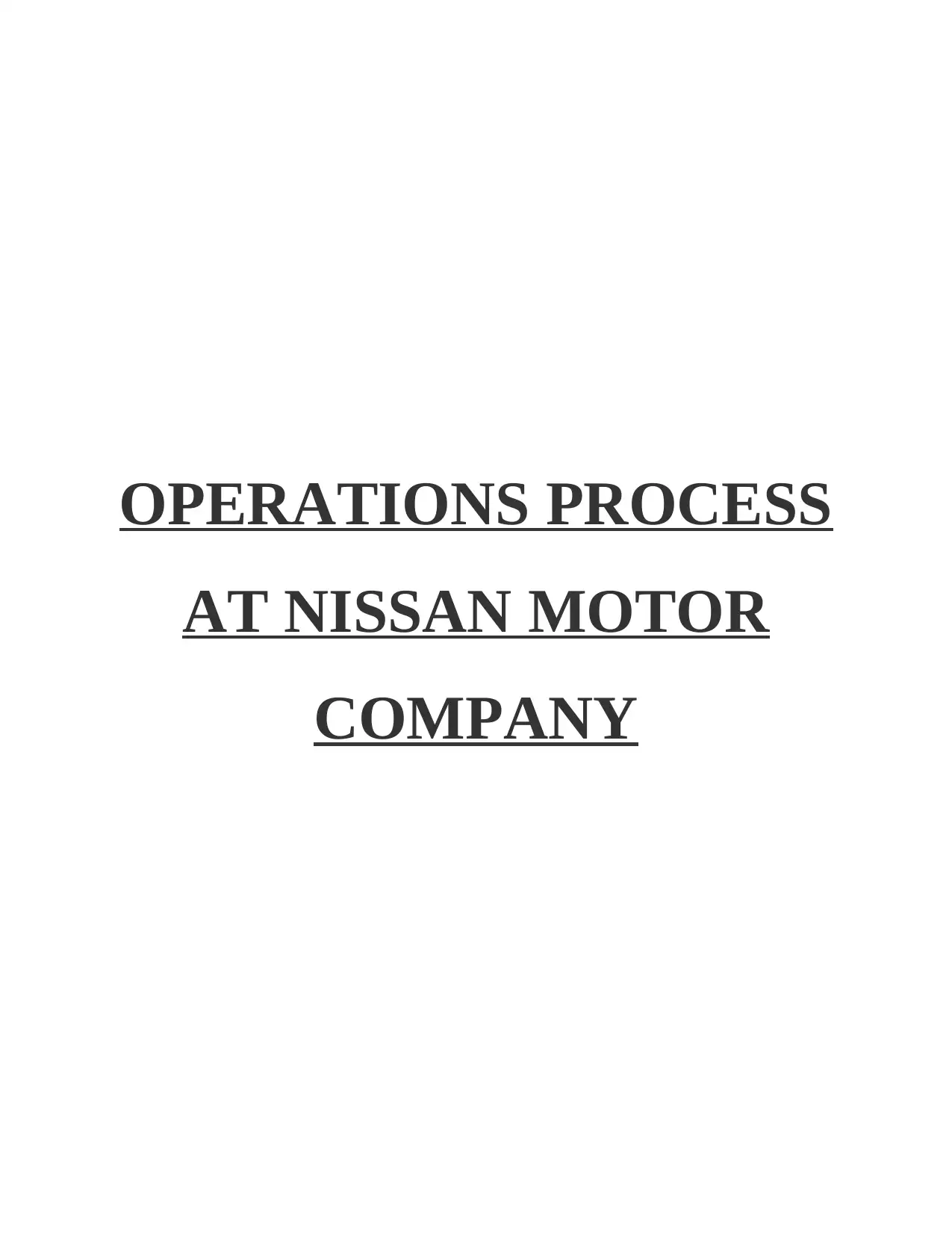
OPERATIONS PROCESS
AT NISSAN MOTOR
COMPANY
AT NISSAN MOTOR
COMPANY
Paraphrase This Document
Need a fresh take? Get an instant paraphrase of this document with our AI Paraphraser

TABLE OF CONTENTS
INTRODUCTION...........................................................................................................................3
MAIN BODY...................................................................................................................................3
Principles applied at Nissan which helps in continuous flow of production...............................3
CONCLUSION................................................................................................................................5
REFERENCES................................................................................................................................1
INTRODUCTION...........................................................................................................................3
MAIN BODY...................................................................................................................................3
Principles applied at Nissan which helps in continuous flow of production...............................3
CONCLUSION................................................................................................................................5
REFERENCES................................................................................................................................1
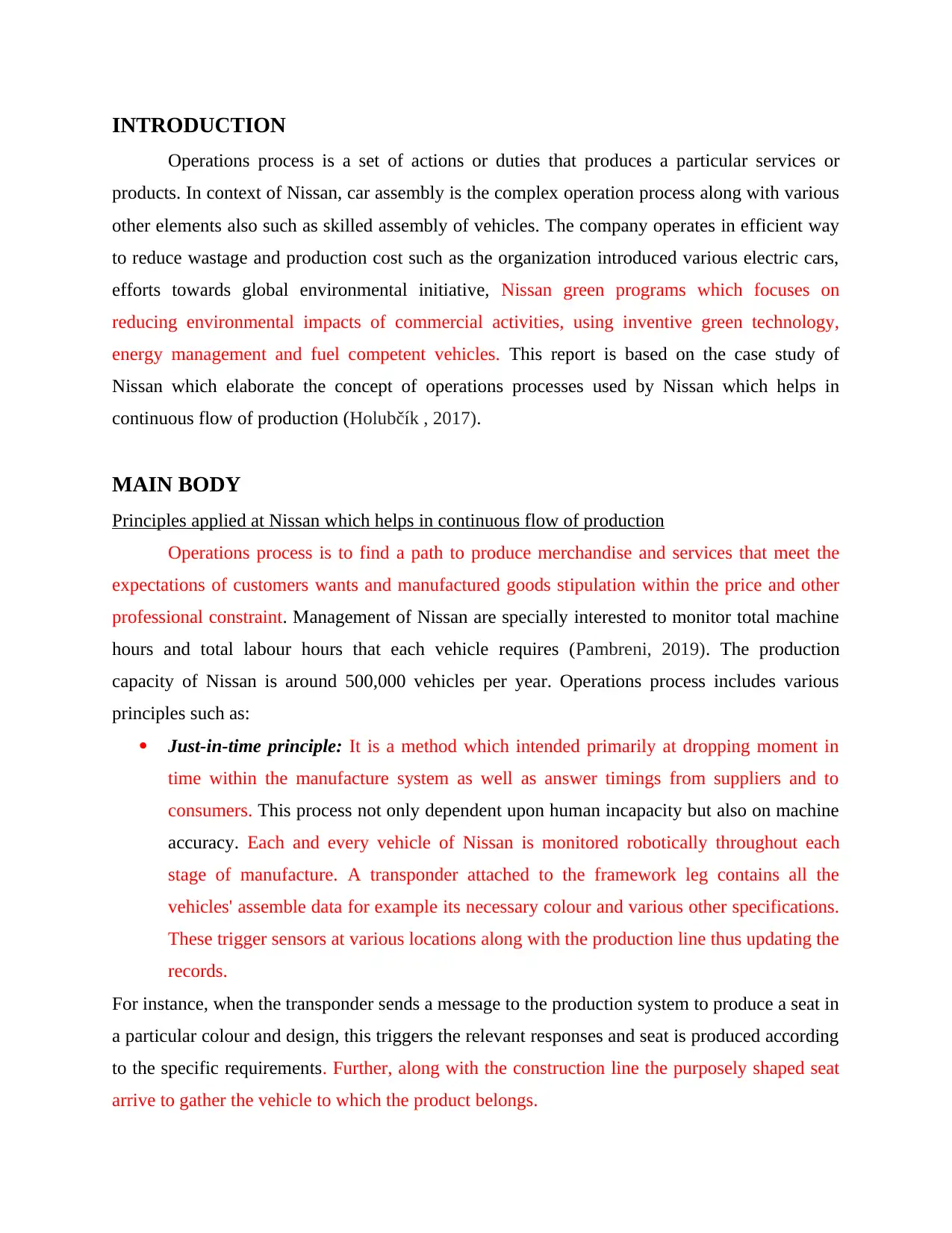
INTRODUCTION
Operations process is a set of actions or duties that produces a particular services or
products. In context of Nissan, car assembly is the complex operation process along with various
other elements also such as skilled assembly of vehicles. The company operates in efficient way
to reduce wastage and production cost such as the organization introduced various electric cars,
efforts towards global environmental initiative, Nissan green programs which focuses on
reducing environmental impacts of commercial activities, using inventive green technology,
energy management and fuel competent vehicles. This report is based on the case study of
Nissan which elaborate the concept of operations processes used by Nissan which helps in
continuous flow of production (Holubčík , 2017).
MAIN BODY
Principles applied at Nissan which helps in continuous flow of production
Operations process is to find a path to produce merchandise and services that meet the
expectations of customers wants and manufactured goods stipulation within the price and other
professional constraint. Management of Nissan are specially interested to monitor total machine
hours and total labour hours that each vehicle requires (Pambreni, 2019). The production
capacity of Nissan is around 500,000 vehicles per year. Operations process includes various
principles such as:
Just-in-time principle: It is a method which intended primarily at dropping moment in
time within the manufacture system as well as answer timings from suppliers and to
consumers. This process not only dependent upon human incapacity but also on machine
accuracy. Each and every vehicle of Nissan is monitored robotically throughout each
stage of manufacture. A transponder attached to the framework leg contains all the
vehicles' assemble data for example its necessary colour and various other specifications.
These trigger sensors at various locations along with the production line thus updating the
records.
For instance, when the transponder sends a message to the production system to produce a seat in
a particular colour and design, this triggers the relevant responses and seat is produced according
to the specific requirements. Further, along with the construction line the purposely shaped seat
arrive to gather the vehicle to which the product belongs.
Operations process is a set of actions or duties that produces a particular services or
products. In context of Nissan, car assembly is the complex operation process along with various
other elements also such as skilled assembly of vehicles. The company operates in efficient way
to reduce wastage and production cost such as the organization introduced various electric cars,
efforts towards global environmental initiative, Nissan green programs which focuses on
reducing environmental impacts of commercial activities, using inventive green technology,
energy management and fuel competent vehicles. This report is based on the case study of
Nissan which elaborate the concept of operations processes used by Nissan which helps in
continuous flow of production (Holubčík , 2017).
MAIN BODY
Principles applied at Nissan which helps in continuous flow of production
Operations process is to find a path to produce merchandise and services that meet the
expectations of customers wants and manufactured goods stipulation within the price and other
professional constraint. Management of Nissan are specially interested to monitor total machine
hours and total labour hours that each vehicle requires (Pambreni, 2019). The production
capacity of Nissan is around 500,000 vehicles per year. Operations process includes various
principles such as:
Just-in-time principle: It is a method which intended primarily at dropping moment in
time within the manufacture system as well as answer timings from suppliers and to
consumers. This process not only dependent upon human incapacity but also on machine
accuracy. Each and every vehicle of Nissan is monitored robotically throughout each
stage of manufacture. A transponder attached to the framework leg contains all the
vehicles' assemble data for example its necessary colour and various other specifications.
These trigger sensors at various locations along with the production line thus updating the
records.
For instance, when the transponder sends a message to the production system to produce a seat in
a particular colour and design, this triggers the relevant responses and seat is produced according
to the specific requirements. Further, along with the construction line the purposely shaped seat
arrive to gather the vehicle to which the product belongs.
⊘ This is a preview!⊘
Do you want full access?
Subscribe today to unlock all pages.

Trusted by 1+ million students worldwide
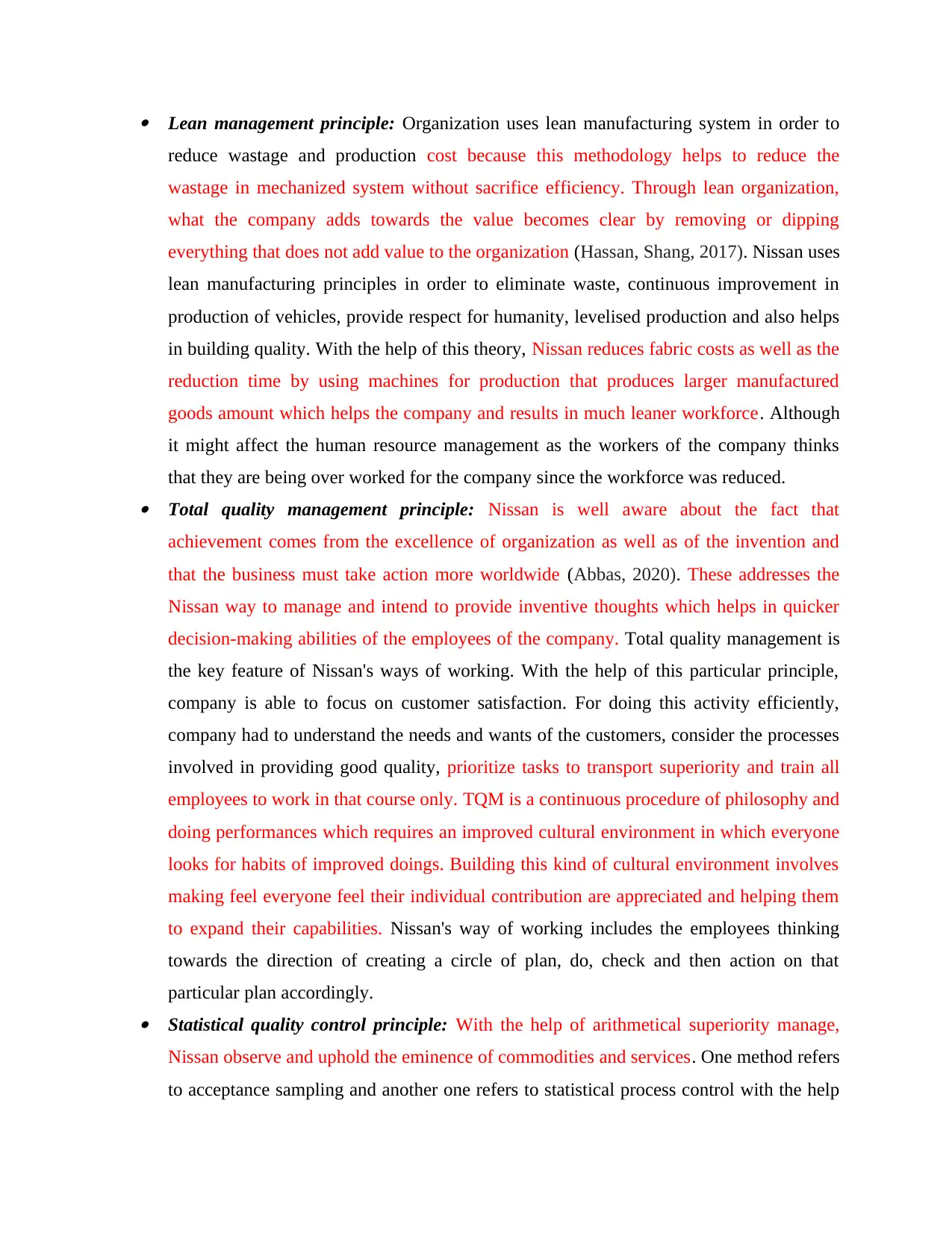
Lean management principle: Organization uses lean manufacturing system in order to
reduce wastage and production cost because this methodology helps to reduce the
wastage in mechanized system without sacrifice efficiency. Through lean organization,
what the company adds towards the value becomes clear by removing or dipping
everything that does not add value to the organization (Hassan, Shang, 2017). Nissan uses
lean manufacturing principles in order to eliminate waste, continuous improvement in
production of vehicles, provide respect for humanity, levelised production and also helps
in building quality. With the help of this theory, Nissan reduces fabric costs as well as the
reduction time by using machines for production that produces larger manufactured
goods amount which helps the company and results in much leaner workforce. Although
it might affect the human resource management as the workers of the company thinks
that they are being over worked for the company since the workforce was reduced. Total quality management principle: Nissan is well aware about the fact that
achievement comes from the excellence of organization as well as of the invention and
that the business must take action more worldwide (Abbas, 2020). These addresses the
Nissan way to manage and intend to provide inventive thoughts which helps in quicker
decision-making abilities of the employees of the company. Total quality management is
the key feature of Nissan's ways of working. With the help of this particular principle,
company is able to focus on customer satisfaction. For doing this activity efficiently,
company had to understand the needs and wants of the customers, consider the processes
involved in providing good quality, prioritize tasks to transport superiority and train all
employees to work in that course only. TQM is a continuous procedure of philosophy and
doing performances which requires an improved cultural environment in which everyone
looks for habits of improved doings. Building this kind of cultural environment involves
making feel everyone feel their individual contribution are appreciated and helping them
to expand their capabilities. Nissan's way of working includes the employees thinking
towards the direction of creating a circle of plan, do, check and then action on that
particular plan accordingly. Statistical quality control principle: With the help of arithmetical superiority manage,
Nissan observe and uphold the eminence of commodities and services. One method refers
to acceptance sampling and another one refers to statistical process control with the help
reduce wastage and production cost because this methodology helps to reduce the
wastage in mechanized system without sacrifice efficiency. Through lean organization,
what the company adds towards the value becomes clear by removing or dipping
everything that does not add value to the organization (Hassan, Shang, 2017). Nissan uses
lean manufacturing principles in order to eliminate waste, continuous improvement in
production of vehicles, provide respect for humanity, levelised production and also helps
in building quality. With the help of this theory, Nissan reduces fabric costs as well as the
reduction time by using machines for production that produces larger manufactured
goods amount which helps the company and results in much leaner workforce. Although
it might affect the human resource management as the workers of the company thinks
that they are being over worked for the company since the workforce was reduced. Total quality management principle: Nissan is well aware about the fact that
achievement comes from the excellence of organization as well as of the invention and
that the business must take action more worldwide (Abbas, 2020). These addresses the
Nissan way to manage and intend to provide inventive thoughts which helps in quicker
decision-making abilities of the employees of the company. Total quality management is
the key feature of Nissan's ways of working. With the help of this particular principle,
company is able to focus on customer satisfaction. For doing this activity efficiently,
company had to understand the needs and wants of the customers, consider the processes
involved in providing good quality, prioritize tasks to transport superiority and train all
employees to work in that course only. TQM is a continuous procedure of philosophy and
doing performances which requires an improved cultural environment in which everyone
looks for habits of improved doings. Building this kind of cultural environment involves
making feel everyone feel their individual contribution are appreciated and helping them
to expand their capabilities. Nissan's way of working includes the employees thinking
towards the direction of creating a circle of plan, do, check and then action on that
particular plan accordingly. Statistical quality control principle: With the help of arithmetical superiority manage,
Nissan observe and uphold the eminence of commodities and services. One method refers
to acceptance sampling and another one refers to statistical process control with the help
Paraphrase This Document
Need a fresh take? Get an instant paraphrase of this document with our AI Paraphraser
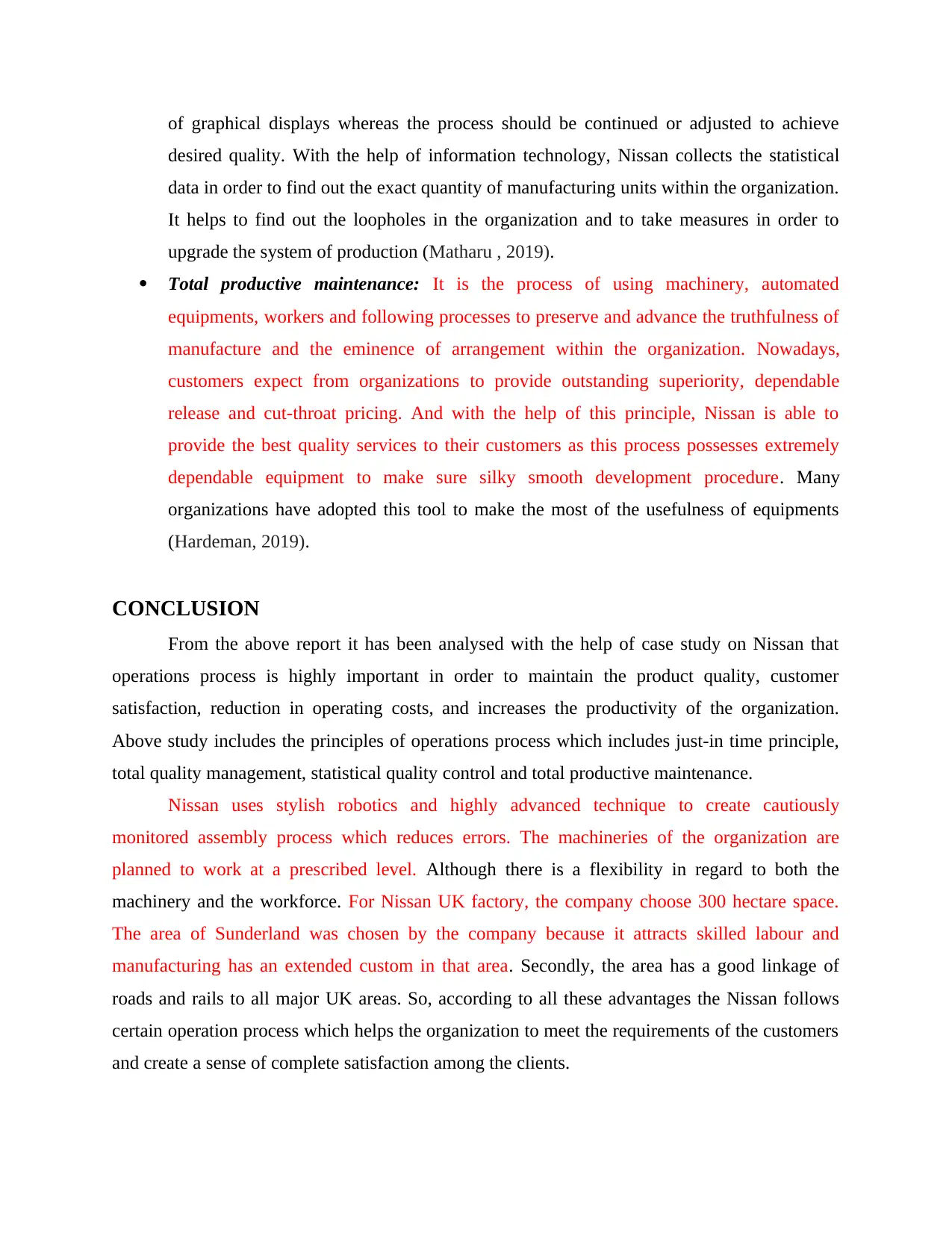
of graphical displays whereas the process should be continued or adjusted to achieve
desired quality. With the help of information technology, Nissan collects the statistical
data in order to find out the exact quantity of manufacturing units within the organization.
It helps to find out the loopholes in the organization and to take measures in order to
upgrade the system of production (Matharu , 2019).
Total productive maintenance: It is the process of using machinery, automated
equipments, workers and following processes to preserve and advance the truthfulness of
manufacture and the eminence of arrangement within the organization. Nowadays,
customers expect from organizations to provide outstanding superiority, dependable
release and cut-throat pricing. And with the help of this principle, Nissan is able to
provide the best quality services to their customers as this process possesses extremely
dependable equipment to make sure silky smooth development procedure. Many
organizations have adopted this tool to make the most of the usefulness of equipments
(Hardeman, 2019).
CONCLUSION
From the above report it has been analysed with the help of case study on Nissan that
operations process is highly important in order to maintain the product quality, customer
satisfaction, reduction in operating costs, and increases the productivity of the organization.
Above study includes the principles of operations process which includes just-in time principle,
total quality management, statistical quality control and total productive maintenance.
Nissan uses stylish robotics and highly advanced technique to create cautiously
monitored assembly process which reduces errors. The machineries of the organization are
planned to work at a prescribed level. Although there is a flexibility in regard to both the
machinery and the workforce. For Nissan UK factory, the company choose 300 hectare space.
The area of Sunderland was chosen by the company because it attracts skilled labour and
manufacturing has an extended custom in that area. Secondly, the area has a good linkage of
roads and rails to all major UK areas. So, according to all these advantages the Nissan follows
certain operation process which helps the organization to meet the requirements of the customers
and create a sense of complete satisfaction among the clients.
desired quality. With the help of information technology, Nissan collects the statistical
data in order to find out the exact quantity of manufacturing units within the organization.
It helps to find out the loopholes in the organization and to take measures in order to
upgrade the system of production (Matharu , 2019).
Total productive maintenance: It is the process of using machinery, automated
equipments, workers and following processes to preserve and advance the truthfulness of
manufacture and the eminence of arrangement within the organization. Nowadays,
customers expect from organizations to provide outstanding superiority, dependable
release and cut-throat pricing. And with the help of this principle, Nissan is able to
provide the best quality services to their customers as this process possesses extremely
dependable equipment to make sure silky smooth development procedure. Many
organizations have adopted this tool to make the most of the usefulness of equipments
(Hardeman, 2019).
CONCLUSION
From the above report it has been analysed with the help of case study on Nissan that
operations process is highly important in order to maintain the product quality, customer
satisfaction, reduction in operating costs, and increases the productivity of the organization.
Above study includes the principles of operations process which includes just-in time principle,
total quality management, statistical quality control and total productive maintenance.
Nissan uses stylish robotics and highly advanced technique to create cautiously
monitored assembly process which reduces errors. The machineries of the organization are
planned to work at a prescribed level. Although there is a flexibility in regard to both the
machinery and the workforce. For Nissan UK factory, the company choose 300 hectare space.
The area of Sunderland was chosen by the company because it attracts skilled labour and
manufacturing has an extended custom in that area. Secondly, the area has a good linkage of
roads and rails to all major UK areas. So, according to all these advantages the Nissan follows
certain operation process which helps the organization to meet the requirements of the customers
and create a sense of complete satisfaction among the clients.

⊘ This is a preview!⊘
Do you want full access?
Subscribe today to unlock all pages.

Trusted by 1+ million students worldwide
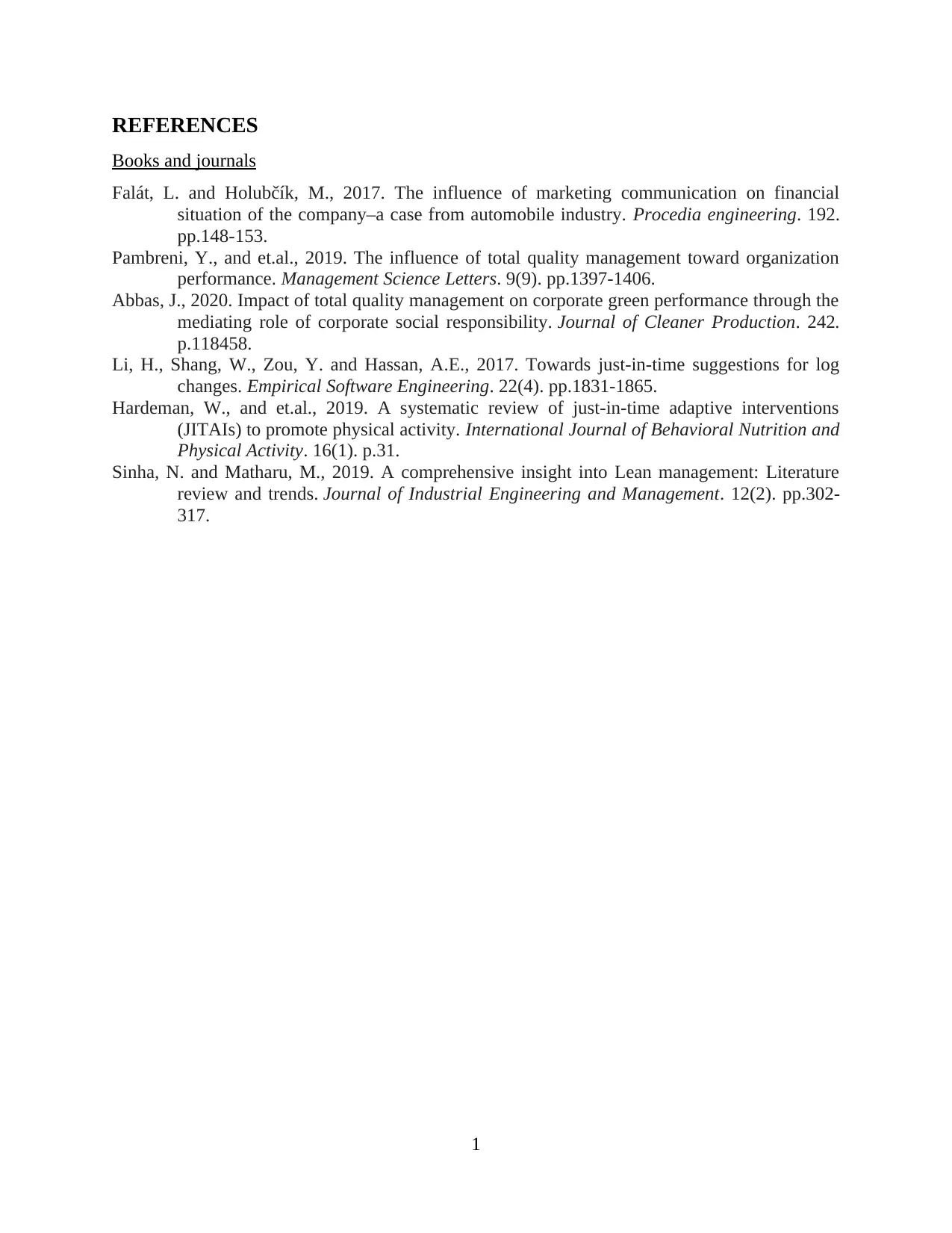
REFERENCES
Books and journals
Falát, L. and Holubčík, M., 2017. The influence of marketing communication on financial
situation of the company–a case from automobile industry. Procedia engineering. 192.
pp.148-153.
Pambreni, Y., and et.al., 2019. The influence of total quality management toward organization
performance. Management Science Letters. 9(9). pp.1397-1406.
Abbas, J., 2020. Impact of total quality management on corporate green performance through the
mediating role of corporate social responsibility. Journal of Cleaner Production. 242.
p.118458.
Li, H., Shang, W., Zou, Y. and Hassan, A.E., 2017. Towards just-in-time suggestions for log
changes. Empirical Software Engineering. 22(4). pp.1831-1865.
Hardeman, W., and et.al., 2019. A systematic review of just-in-time adaptive interventions
(JITAIs) to promote physical activity. International Journal of Behavioral Nutrition and
Physical Activity. 16(1). p.31.
Sinha, N. and Matharu, M., 2019. A comprehensive insight into Lean management: Literature
review and trends. Journal of Industrial Engineering and Management. 12(2). pp.302-
317.
1
Books and journals
Falát, L. and Holubčík, M., 2017. The influence of marketing communication on financial
situation of the company–a case from automobile industry. Procedia engineering. 192.
pp.148-153.
Pambreni, Y., and et.al., 2019. The influence of total quality management toward organization
performance. Management Science Letters. 9(9). pp.1397-1406.
Abbas, J., 2020. Impact of total quality management on corporate green performance through the
mediating role of corporate social responsibility. Journal of Cleaner Production. 242.
p.118458.
Li, H., Shang, W., Zou, Y. and Hassan, A.E., 2017. Towards just-in-time suggestions for log
changes. Empirical Software Engineering. 22(4). pp.1831-1865.
Hardeman, W., and et.al., 2019. A systematic review of just-in-time adaptive interventions
(JITAIs) to promote physical activity. International Journal of Behavioral Nutrition and
Physical Activity. 16(1). p.31.
Sinha, N. and Matharu, M., 2019. A comprehensive insight into Lean management: Literature
review and trends. Journal of Industrial Engineering and Management. 12(2). pp.302-
317.
1
1 out of 7
Related Documents
Your All-in-One AI-Powered Toolkit for Academic Success.
+13062052269
info@desklib.com
Available 24*7 on WhatsApp / Email
![[object Object]](/_next/static/media/star-bottom.7253800d.svg)
Unlock your academic potential
Copyright © 2020–2026 A2Z Services. All Rights Reserved. Developed and managed by ZUCOL.





